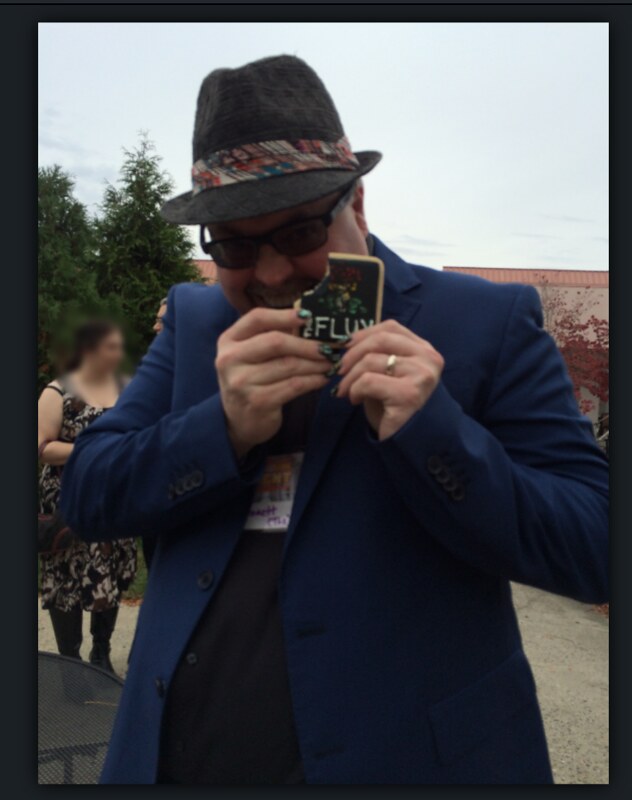Citizen Pie: Pizza Brought To You By The Creator Of The Velvet Tango Room
Long-time readers will have heard me rhapsodize about the Velvet Tango Room’s cocktails on any number of occasions – and I’m not alone! When America’s Top Ten bars are tallied up, the VTR frequently makes the list.
(In Cleveland? you may scoff. As it turns out, Cleveland is where New York chefs go when they want a cheaper rent and an equally appreciative audience, so over the last eight years or so there’s been a culinary renaissance in the land of Cleve. We’ve got quality restaurants and drinking up the wazoo, in part due to groundbreakers like the VTR.)
The VTR, lest you need a refresher course, does everything by hand – squeezing, shaking, and pouring only top-tier ingredients. They spent $10,000 in a quest to find the perfect ice cubes. They once tried to find a restaurant to do paired tastings with, until they realized their drinks were so complex that the whole point was each taste was a separate experience. They have a Bourbon Daisy with a fifteen-second outbreath, a constantly mutating mixture of sweetness and bourbon and ginger that tingles on your tongue.
So when Paulius, the owner of the VTR, told me he was opening up a pizza shop, you bet your ass I listened.
And on Friday, we got an invite to a preview of Citizen Pie. So you bet your ass we went.
 While the Velvet Tango Room is a destination place, where you sit down and savor, Citizen Pie is more of an informal area – across the street from the Beachland Ballroom, it’s where you snag a ‘za before or after the band plays. Yet Paulius and his pizza chef V have paid attention to details: using only four ingredients in the bread dough because they want the purest experience, spending weeks slowly heating up the great wood-heated pizza oven so it’s seasoned properly, getting the freshest ingredients.
While the Velvet Tango Room is a destination place, where you sit down and savor, Citizen Pie is more of an informal area – across the street from the Beachland Ballroom, it’s where you snag a ‘za before or after the band plays. Yet Paulius and his pizza chef V have paid attention to details: using only four ingredients in the bread dough because they want the purest experience, spending weeks slowly heating up the great wood-heated pizza oven so it’s seasoned properly, getting the freshest ingredients.

We sat down. I ordered a classic, the Marinara – only four ingredients, because I needed to be able to compare this to other pizzas. What I got was this, the third pizza Citizen Pie ever sold:

These are small pizzas, with light dough, meant to be eaten in one serving. (The chef critiqued the pizza as slightly burned on one side, and had a word with the staff.)
And as I bit into it, I got a strong blast of perfectly seasoned tomato layered thinly across crispy/chewy dough – so much flavor contained in a millimeter of topping that I actually froze for a moment at all the deliciousness in my mouth. I’m usually into thicker, Chicago-style pizzas, but this one was so light and airy and yet satisfying to the tooth that I immediately wanted slice #2.
Then I got a garlic clove on the next bite, and the whole thing turned electric. If I ordered this one the next time, I’d get extra garlic, because that zing of the garlic and the intensity of the tomato made my whole mouth resonate. There was only a hint of cheese taste – the tomato was definitely the star of the dish.
Gini got the caponata, a mishmash of all sorts of ingredients ranging from eggplant to gaeta olives to pinenuts and currents and basil. And I was distressed at first, because the ingredients were so poorly distributed, until it was explained to me that the chef made them that way on purpose, so every bite would be a new experience. Which is great, unless your wife will only let you have one slice!

What I got had pine nuts and olives, and the olives were the best I’ve ever had on pizza. I generally don’t like olives, as the canned ones are too salty, but these olives sank into the taste of the cheese, providing a rich satiny mouthfeel. The cheeses seemed to meld with the dough, becoming an integral part, as opposed to too many restaurants that glop on a layer of cheese that slides off the minute you pick up the pizza.
(The only ding I’d have here is the cherry tomatoes, which were supposed to be cooked to the consistency of stewed, dripped a lot of water over the dough and made it prematurely soggy. But hey, that was literally the second pizza they served to a customer, if I recall correctly.)
And soon, our pizza looked like this:

To finish off, I tried their ricotta cheesecake, which was rich and had a soft grainy texture that made the ricotta obvious, with hints of floral and citrus throughout it. It was maybe a touch too cold from the fridge, but on the whole, delicious.

Citizen Pie is a small place, just big enough for a handful of customers to sit down, grab a pizza, and get out. It’s pleasant enough, but the food is the star, and one suspects Beachland Ballroom folks will be planning trips to Citizen Pie before the show to tank up on some pretty friggin’ awesome authentic Italian pizza.
They’re opening today. If you’re in Cleveland, check ’em out.
My Experimental Film: Why My Plotting Is Ahead Of My Understanding
So last night, I walked around the block with Gini and plotted out the last third of the last book* in the ‘Mancer series, Fix. I knew what the characters had to do.
Tonight, I spent two hours downstairs, knowing what they would do, trying to understand why they’d do it.
Which sounds really fucking bizarre if you’re not a writer – and maybe bizarre if you are. But I’m a gardener, and whenever I write I think of this song from They Might Be Giants:
Specifically the line, “I already know the ending, it’s the part that makes your face implode. I don’t know what makes your face implode, but that’s the way the movie ends.”
And seriously, that’s the way I work. I have long realized to trust my subconscious – it doesn’t plot that far in advance. I only see a chapter or two ahead of me. And around midway through the book, it’ll say something like, “The invasion triggers a broach, and Paul heals the broach. Now write that chapter.”
If you’ve read Flex, you’ll understand that that moment is one of the central points of the entire series. It’s where we see that Paul’s powers are beyond what we thought they were – and, more importantly, that Paul’s worldview is fundamentally one of justice.
Thing is, Paul’s world view when I started to write that scene was not justice.
When I wrote Flex initially, Paul was a scheming politician whose ambitions were thwarted when he lost his foot in a magical battle. And he used bureaucracy as a way to subvert the system, and – actually, hell, it was a first draft, I didn’t actually know why he had bureaucromancy as a power, I just knew he did. And when a confluence of magic punched a hole clean through to the demon dimensions, I went, “Paul can clean this up.”
At which point I went, “Wait, why can he clean this up?”
And my subconscious went, you know.
And I went into that chapter completely blind as to why Paul would heal the broach or even why he’d think he could do it, given that Paul was sort of a greedy jerk at this stage of the manuscript. And the broach got triggered, and the buzzsects started to gnaw their way through the laws of physics, and I went, “Why does Paul heal this?”
And I realized:
Paul was offended.
The broach was scary, but Paul was fastidious enough that watching the laws of physics gnawed away offended his sense of order. And I realized: Paul was not a greedy politician, as I had somehow thought for the last 50,000 words – Paul was the kind of guy who straightened library shelves in his spare time, because he believed things should be set right.
He was not a greedy politician, but a supercharged Radar O’Reilly.
My subconscious knew that having Paul heal that broach was absolutely what Paul had to do, but I did not know why he did it until I walked around for two hours in my basement, pacing madly, muttering, “I don’t know what makes his face implode, but that’s the way the movie ends.” I had leapt out into the void over a great stadium with the absolute faith that my subconscious was swinging a trapeze at me, and I clutched my fingers in the dark until I caught wood.
Once I understood what my subconscious was trying to get me to do, the rest of that novel snapped into focus.
And this evening, I knew exactly what Aliyah and Valentine had to do. But I had no idea why they had to do it. I knew Valentine had to call her boyfriend, and Aliyah had to sit by [REDACTED]’s bedside where she’d do [REDACTED] magic –
But none of the motivations I’d given them at the end of Act II made any sense.
So I kept trying on various rationales. Okay, maybe Aliyah would do this because she was sad. No, that didn’t work. Maybe Aliyah was just fooling around with this newfound magic and stumbles by [REDACTED]’s bedside. No, that doesn’t work. Maybe Aliyah was trying to heal that character –
And I spent two hours pacing the basement again, trusting that my subconscious was right, and that no, Aliyah had to sit by the bedside and do magic.
I just had to find the right reason for that, and when I did, I would know why the rest of the plot made sense. And I took seven pages of notes, scribbling frantically, notes that often included heavy-hitters like Boy, you don’t make it easy, Steinmetz and No, that doesn’t make sense and How is this an expression of love, or is it?
And I would think I was insane, except I heard Brandon Sanderson say on a panel that he plotted his books beginning to end before he started – but he couldn’t write his chapters out of order, because sometimes he didn’t know why his characters were doing the things they were doing until he got there.
I wrote seven pages of notes, and eventually the notes stopped being why would they do this and mutated into wouldn’t it be cool if this happened as a result of them doing this, and I got to understand Valentine and Aliyah a little more because yes, I know why Valentine is calling her boyfriend and it’s going to break your heart, and Aliyah is sitting by that bedside because what she does there will cause a misunderstanding that gets someone killed.
But I know now.
And I don’t know how I knew, but I know.
You’re all gonna be in this experimental film
And even though I can’t explain it
I already know how great it is
* – If you’d asked me when I was writing Flex, I’d have said it was a solo book – yet when I got to the end, I thought, “Well, maybe there’s more here.” When I wrote The Flux, I said, “This is it, I’m putting everything I have into it, there will be nothing left,” yet when I got about 90% done, I thought, “Crap, there’s some threads I could explore.”
I am about 70% through Fix, and I swear to God this is all I have to say about the Tsabo-Dawson family, but I’ve thought that twice before so who fucking knows?
Witness My FLEX-Themed Cookies!
So when I attended the Geeky Kink Event to give some seminars on holding effective polyamory, organizer Jeff Mach offered to hold a The Flux-themed book release party.
And because all my book release parties have to be special, I had some Flex-themed cookies made at Sparkles Bake Shop – which, if you’re anywhere near New Jersey and need some kick-ass cookies, I would highly recommend.
But seriously! Check out these fuckin’ cookies!


Of course I wore my Fine Italian Suit:

The amusing thing was that people who’d read the books were happy to eat the cookies called Flex, but they had concerned about eating The Flux cookies. Wise people. They know what happens when you absorb a flux load.
The cookies were tasty, although (as also happened with my Flex-themed cake) the black frosting would do horrible things to your teeth. WARNING TO AUTHORS: If you have a dark cover, your book-themed sucrose interpretations will give people a blemished smile! Now that’s the kind of pro tips y’all are showing up here for.
One last bit: I always tell people at conventions that I am so happy to be an author I’ll sign anything you put in front of me. Because this was a kink convention, three people went, “ANYthing?” and I reiterated anything.
Man, if you wanna feel like a goddamned rock star, try signing, er, anything. It’s a good feeling.
Four Things I'd Like To See In The New Star Trek TV Series
Star Trek Desire #1: A Viewpoint.
While the fandom is messy, there’s generally a consensus: either The Original Star Trek or Next Generation were the best, followed by the dark horse of Deep Space Nine, then Voyager and Enterprise leading up the rear.
I’d argue that’s because Star Trek, at its best, has a sharp agenda that’s not afraid to throw elbows.
TOS had a distinctly martial feel to it: sacrifice was needed to protect good people, sometimes even the lives of good people (witness poor Edith Keeler). While you had to retain compassion, when you found Actual Evil you had to be ready to kill it. And the best old Star Treks were often the ones that explored the gaps in that philosophy – where something that looked evil turned out to be not what it seemed.
Whereas TNG supposed that almost everything could be negotiated with profitably, that all creatures had some decency inside, and the best Star Treks were often the ones that questioned that philosophy – especially when The Borg, an enemy that seemed tailor-made to destroy that assumption, showed up.
And Deep Space Nine, it must be said, only really got interesting when it got a philosophy a few seasons in, and Sisko’s willingness to show the dark underbelly of the Federation turned up. And when Sisko started compromising his morals profitably, that became riveting.
But each philosophy turned off some people. I know some folks who won’t watch TOS because frankly, Kirk exists to fight it or fuck it, and they don’t want to watch that. Some folks won’t watch TNG because it’s too huggy. Some folks hate DS9 because it is about moral compromise.
What philosophies did the movies have?
Pretty much none.
So I want a Star Trek that, primarily, takes a viewpoint on What Makes Civilization Great and then starts questioning that assumption through action-driven plots. And no, I don’t know what that viewpoint should be – but like TOS was a reaction to the Cold War mentality that permeated the 1960s and TNG was a reaction to Reagan and Bush’s New Order, this new series should be a reaction to today’s battles.
And yeah, that’s a complex issue. But when Star Trek doesn’t have a cohesive viewpoint, it’s… okay. Like the movies. Like the first few seasons of Voyager and Enterprise (and maybe they got better later on, but I never got there). But it’s not compelling. It’s just idiots wandering around in space, and that’s something you can get anywhere these days.
What we need is a Star Trek that tells us when we’ve made the wrong choices. And yes, that risks getting preachy. That’s another failure state of Star Trek.
I’ll be honest: I would by far rather watch a Libertarian Star Trek – a viewpoint I generally loathe – than I would a generic Star Trek. Because the Libertarian Star Trek would be something I couldn’t get anywhere else.
Star Trek Desire #2: A Trans Gay Crew Member Whose Presence Is Not Questioned
Star Trek’s lack of gay people has long been a shame – there’s been a few in the crevices, but none front and center. And we’re long beyond needing a gay person on the crew, especially since gayness has largely been normalized on television.
I want a trans queer person on the fucking crew.
And I don’t want storylines where that trans queer person finds acceptance.
A most centrist friend of mine derided me for this desire, saying, “Oh, a person being accepted? Now, that’s the stuff of drama.” And no, it isn’t. But if Star Trek posits a world view, as I’ve said I want in #1, then part of that world view is what is not questioned.
There were no Uhura storylines about whether a black woman would be accepted on the ship.
There were no Chekov storylines questioning whether a Russian man would be accepted.
There were no Geordie storylines about whether the crew could handle a handicapped man.
And in my Star Trek, I’d want someone who had issues that were a part of the plotline – the dating issues that arise when you’re trans and queer are good fodder, especially if we posit an accepting Star Trek where everyone isn’t uniformly hetero/homo/bisexual – but I don’t want storylines where the trans member is subjected to ridicule and everyone works it out afterwards.
Show some fucking respect.
Star Trek Desire #3: A Sex-Positive Male Character
I’ve written about this before, but one of the great issues with the movie is that it took TOS Kirk – who had a lot of sex, but also seemed to genuinely value his quote-unquote “conquests” as people – and turned the movie Kirk into someone who used people for sex, forgetting their names.
I’d like to have a male character who doesn’t commit, but also genuinely cares about the people he’s sleeping with. Not a love-’em-and-leave-’em person, but someone who doesn’t view sex as an act of friendship, if not commitment. Someone unapologetic about his desires, but also respectful if someone doesn’t return them.
When have you seen that character on television? Maaaaaaybe Captain Jack Harkness, and look at his fanbase. Now imagine doing that better.
Star Trek Desire #4: A Well-Characterized Enemy
As noted, Star Trek only gets good when they find an enemy who hits them in their weak philosophical points. The Borg and the Klingons were effective not because they were badass – though they were – but because they forced the characters to question the show’s viewpoints.
And in both TOS and DS9, the villains were kiiiiinda lame for the first two seasons. Ferengi? Not so much.
So I’d want the writers to consider who is the Big Bad – and why. Snap judgment is to go, “Oh, more Klingons!” – but why would the Klingons be the enemy? It’s like having a Starbucks across the street – yes, it’s supposed to be there, but what function does it serve to the plot?
When you devise what this new Star Trek’s viewpoint is, posit a villain who hits them in all their worst points. I suspect that villain, these days, would look a lot like either terrorism or a government that oppresses its people Ferguson-style while wrapping itself in a cloak of patriotism. I’d be okay with either, or both. But make them relevant. Make them someone we want to see defeated, and badly.
It Feels Good To Yell At People, Or Maybe To Bomb Them
My teenaged daughters were teenaged – so, by definition, they were snide and thoughtless at times. And every so often they’d make a mess in the living room and then mouth off to me.
And a few times, when they caught me in a bad mood, I went off on them.
I screamed that they were thoughtless, rude idiots, and yelled that they fucking had no right to snark to me when it was their mess, and that they should clean that shit up right the fuck now and then shut the hell up in the future.
I was pure with justification.
And when it was done, I’d go off into another room, and realize what I’d done, and talk myself down. They were disrespectful, I’d tell myself. They need to be taught a lesson about responsibility. They can’t go around talking to people like that.
Then, I’d think: But you just went around talking to people like that.
And it was not satisfying at all, because it was so cathartic to finally unload on someone who deserved it – but this was not, ultimately, the lesson I wanted to teach my children. So I went back in, teeth gritted, feeling like I was betraying some primal eye-for-an-eye principle, and said:
“Look. I’m sorry. You did something bad, and I’m not going to excuse that – but I unloaded on you in a way that was inappropriate, and I’m sorry, and I hope you can forgive me for that.”
Speaking those words were always difficult, and never felt nearly as good as just screaming.
But it taught them the right lessons.
And the lesson that taught me was that the right thing to do is rarely the same as the thing that feels good to do. I’d rather eat a candy bar than a brussels sprout. I’d rather not bring a mistake I made to my boss’s attention than feel like an idiot in front of the office. I’d rather yell at some jerk who cut me off in traffic rather than wondering, “Is she having as bad a day as I am? Maybe she’s in a rush because someone she loves has been hurt.”
I think true maturity comes when you start doing the things that aren’t emotionally satisfying that, nevertheless, make for a kinder world.
And I think of the conservatives’ reactions to the Paris bombing, which is largely emotionally reactive. As this Storify of Tweets points out, we have been bombing the shit out of our enemies under the Obama administration, we just haven’t done it with enough flags and machismo so they feel like Big Men about it. Despite Rubio and Trump’s assurance that we’ll just bomb the terrorists out of existence, we’re never going to march triumphant onto the battlefield like we did in WWII and have Hitler conveniently shoot himself in his bunk.
Terrorism isn’t a leader exhorting people to action – it’s a thousand sins of the last generation’s foreign policies coming home to roost. And fixing terrorism involves a mixture of violence and compassion – the left would have us believe we can all sing Kum-Bay-Yah and the terrorists will dissolve in healing light, the right would have us believe we can shoot them in the head until they’ll all be too afraid to strike.
Neither has proven to be true in the long run.
Fixing terrorism is like going back into my rooms to apologize to my daughters. Yeah. They were also at fault, but the best we can do is clean up our personal messes. And it’s not satisfying, and it’s not pretty, and the ugly truth is that, like teenagers, you’re never going to “win” in the sense that you’ll have an obedient robot – every teen, no matter how good, still has a few lulus of days every parent has to grit their teeth through, and we’re never going to have a world where no terrorist attacks occur, either.
Winning against terrorism, if we can win, has to be defined by the uncomfortable and thoroughly unsatisfying metric of “minimizing terrorist attacks.” Which involves the realpolitik of realizing that we work with imperfect tools and those attacks will happen on occasion no matter how hard we try – and also understanding that “flipping out and going with the emotionally satisfying response of crushing some random idiot into the dust to make a point,” as we did with Iraq, is just going to directly lead to the next generation of ISIS.
We need to be mature as a country. I guess it feels good to feel powerful, maybe. But in many ways, that power is yelling – more an illusion of power than actual control.
And had I never done the emotionally unsatisfying thing and apologized to my daughters, what I would have taught them was that it was okay to shit on someone if you had a position of power over them, and that the real crime wasn’t in yelling, it was at yelling at someone who could yell back.
Likewise, I wonder if, via our current policy, what we’re teaching the Middle East is that not that we’re not to be fucked with, but rather that you can justify any shitty behavior with enough firepower. And if that’s the case, maybe we should reconsider the true lessons learned.

